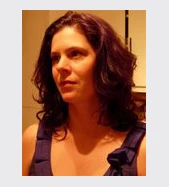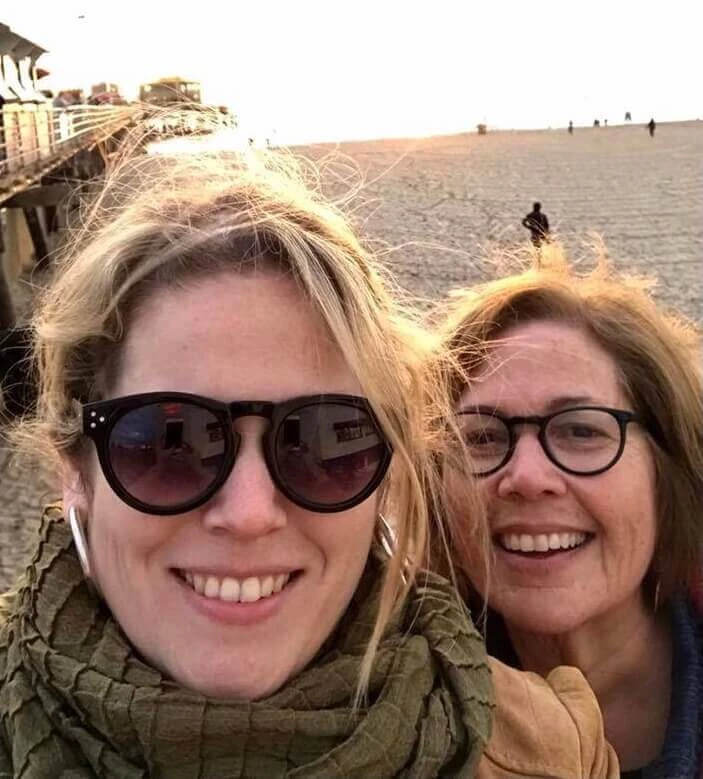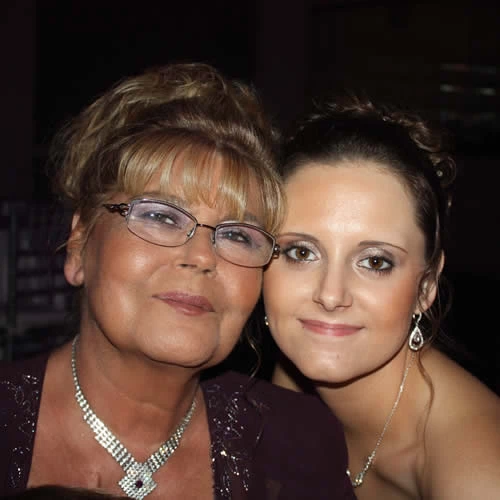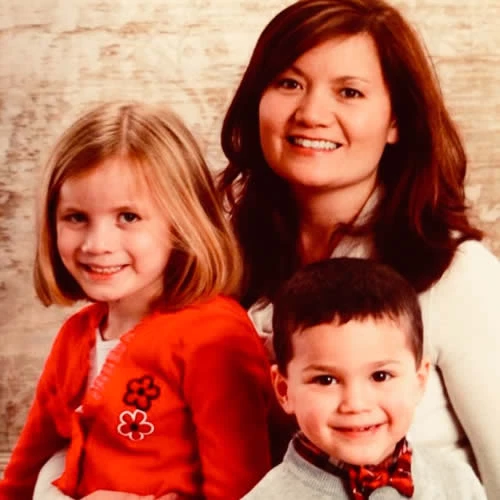Karen M Diagnosed at age 33
"I was diagnosed with Stage 2 invasive ductal carcinoma in my right breast at the age of 33."
Now that my hair has grown back in and I cover up the newly added gray hairs, my eyes are once again framed by eyelashes and I am back putting in 18 hour days as an attorney, wife, and mother of two, people have stopped asking me about my "cancer story". I blend in to the crowd of thirty somethings at the grocery store and the movies, and no one stares when I'm out for a walk. When people see me volunteering at a health fair, the Avon walk, or other breast cancer awareness event, they probably think I am there because of a Mom, Grandmother or Aunt. In fact, the work that I do, I do for others like me – diagnosed too young and out of the blue. I work for other young women, whose proverbial rug has been pulled out from beneath them at the speed of light and in an instant their entire life has changed.
Before getting to my actual story, I'll start with the moral. Breast cancer, like many cancers I suppose, is the gift that keeps on giving. While the intensity of our battle shifts once surgeries have been completed, chemo is over, and the burns have healed from our radiation, the battle scars both physical and psychological remain and are often ignored or underrated. More on that as my story goes on.
I was diagnosed with Stage 2 invasive ductal carcinoma in my right breast at the age of 33. I had no recognized risk factors, though some will argue that a 13 year history of oral contraceptives should be on that list. In the midst of training to run a Team in Training marathon, I was hit with a bad case of shin splints. My physical therapist prescribed a regimen of stretches to be done right after my shower when my muscles are warm. One evening after a work out, I took my shower and begin my stretches in front of my mirror, I looked forward at my reflection and my right breast was visibly crooked. I felt the skin and it took only a second to feel the hard mass close to the surface, pulling my nipple in and towards my breast bone. In my heart I already knew what it was, but as my husband and friends assured me it was nothing, I kept this "knowing" to myself.
The next day I quickly saw my primary care doctor – luckily, unlike the experience of most women my age, she did not "pooh pooh" the lump and brush it off with an admonition that "you are too young for breast cancer." She was concerned and referred me to the California Pacific Breast Health Clinic for a mammogram and ultrasound the next day. This was a Monday. The scans were immediately recognized as suspicious and a core needle biopsy was scheduled. This was Thursday. I waited over the weekend for a Monday appointment for the results. On Monday afternoon, my husband and I waited for our 3 pm date with destiny. We wait half an hour and I think, well it must be nothing – they wouldn't keep me waiting if I had CANCER. We are finally called in and the woman sat us. She slapped down my file on her little desk and said very matter-of-factly, "Well, it is cancer but you are lucky, it's really small." Wait…did she just say I was lucky? I was stunned. Referrals were made and information given and she escorted us out the back door and down some hidden stairway like I am an exile of the cancer world.
Friday I was in surgery. Less than two weeks from my first finding the lump I was in the hospital. I hadn't even digested the news, much less had the chance to tell everyone – a painful process that would take weeks. Everyone thought the tumor would be small and my lumpectomy would be followed by a simple course of radiation. I was told this again and again to where I almost believed the words. Instead, my greatest fears were realized when I came out of the recovery room. My husband leaned into me and answered my question about the sentinel node biopsy with a whispered "yes". Yes, there was more; yes to chemo, yes to more scans and fears of mets. My sentinel node was nearly larger than my original breast tumor – so more than 25 of my lymph nodes were removed.
I took my chemo seriously. I read research and I interviewed oncologists in three cities. Oncologists cited statistics to me about my cancer and my age. They all encouraged me to fight it as aggressively as possible because of the unique attributes of cancer in younger women. I began to ask questions about my long term fertility, only then realizing that it could be in jeopardy. In response to my questions I was told that my treatment would probably not have an impact on my long term fertility and that I could go through egg harvesting, but it wasn't recommended given the ER/PR+ pathology of my tumor. My selected oncologist recommended trying injections of lupron as an unproven method to spare my ovaries. I agreed and moved forward with my first lupron injection, thinking, "Let's just get on with it and worry about the spilt milk later."
My next surgery was to insert the port into my chest- an outpatient procedure performed by my excellent breast surgeon. However, in a few days I began having chest pains and trouble breathing. After a rushed trip to the ER, the diagnosis was that the tube of the catheter is irritating my heart muscle. I had to live with it until it subsided.
A week later we began chemo. In the waiting room, I realized for the first time – no one looked like me! I felt like some hybrid of grown up and child. Even the other chemo patients looked at me like I am a freak! For my first cycle of AC I was given a private room. I watched as the red medicine, mixed especially for me and administered by heavily gowned and gloved nurses, trickled down my iv line straight for the port in my heart. The "red devil," they call it. I cried nearly all the way through.
After two cycles of AC, my hair began to fall out. I had already bought my wig and thought I was prepared. But when my hair came out in whispy clumps and my husband was at work, I called a girlfriend and we cried and drank Coronas as she shaved off my remaining hair with shaky hands. We released handfuls into the air hoping the birds will take them to their nests – I had read about someone else somewhere doing the same and it made me feel better.
After three cycles of AC, I didn't think I could finish. My final Neulasta injection triggered a leukemia reaction and I was hospitalized. A wonderful social worker was always checking on me. She gave me the name of another young woman like myself who had just finished chemo. I make the phone call as well as a life long friend. The survivor, Alexis, is pithy and funny. She single handedly gave me the strength to continue. She and I discovered the Young Survival Coalition together and I stayed up all night reading "Survivor Stories" on the website – blown away that there are so many others out there like me and frustrated that I didn't have the information available there earlier on. Alexis' energy gave me the power back over my own treatment and future. Later, her use of an egg donor and surrogate to have a second child would inspire me to continue my own journey for a family.
After completing 4 cycles of AC and 12 of Taxol and a full 30 days of radiation well before my 35th birthday, I am released on Tamoxifen. My periods never returned and my hormone levels remained suggestive of menopause. Early in the second year of Tamoxifen, my joint pain was so severe that I had to take a break from the drug. During that time, I underwent fertility testing and learned that my odds of conceiving naturally are somewhere around "one in a million" according to the experts…. My husband and I grieve this – another token from this cancer gift that keeps on giving. Ultimately, we began a year long adoption journey which would lead us to our beautiful twin sons, Mercer and Riordan, fulfilling our dream for a family of our own. On my scoreboard against cancer – I chalk up a big win here under my name.
About two years after my diagnosis, I began to lose friends to the disease. I attended the first of many funerals – a friend from my support group: a doctor, mother of two, not even forty. I realize again that the journey is not over just because my treatment is. I continued to have night sweats, weight gain, mood swings courtesy of menopause. For unexplained reasons, my tendons are inflamed easily and began to degrade in my right arm. I underwent additional surgery as a result of what I believe is damage caused by the chemo – no one agreed, but no one could prove otherwise. After losing two more friends to breast cancer in year three, I decided to go back on hormone therapy and my oncologist starts me on Arimidex. Four months after beginning Arimidex, my right lung spontaneously collapsed during a spinning class at the gym. Everyone was surprised – a mystery – highly unusual…. After four days in the hospital, it healed on its own. The final verdict? Damage caused by radiation.
This July I celebrate my fifth year from diagnosis – a huge milestone I will honor by finally having reconstructive surgery. I also celebrate the growth of the Northern California affiliate of the YSC – a group I started after my first anniversary which has slowly and steadily grown thanks to the efforts of some amazing survivors and volunteers. At the same time I celebrate however, I also mourn as another friend is stricken by metastasis to her head and neck. Our futures are all uncertain and each day we live with that understanding – though we look "normal" from the outside, we will forever be anything but.
Are you a survivor, spouse, friend, or caretaker with a story to tell? We'd love to hear from you.





